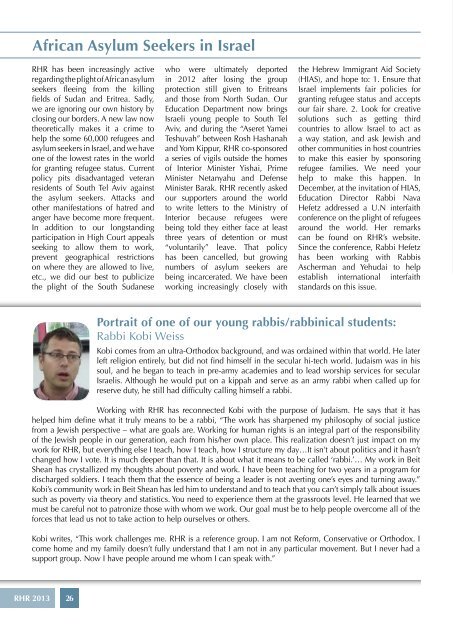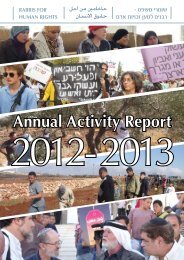Rabbis For Human Rights: The Annual Report 2012-2013
Rabbis For Human Rights: The Annual Report 2012-2013
Rabbis For Human Rights: The Annual Report 2012-2013
Create successful ePaper yourself
Turn your PDF publications into a flip-book with our unique Google optimized e-Paper software.
African Asylum Seekers in Israel<br />
RHR has been increasingly active<br />
regarding the plight of African asylum<br />
seekers fleeing from the killing<br />
fields of Sudan and Eritrea. Sadly,<br />
we are ignoring our own history by<br />
closing our borders. A new law now<br />
theoretically makes it a crime to<br />
help the some 60,000 refugees and<br />
asylum seekers in Israel, and we have<br />
one of the lowest rates in the world<br />
for granting refugee status. Current<br />
policy pits disadvantaged veteran<br />
residents of South Tel Aviv against<br />
the asylum seekers. Attacks and<br />
other manifestations of hatred and<br />
anger have become more frequent.<br />
In addition to our longstanding<br />
participation in High Court appeals<br />
seeking to allow them to work,<br />
prevent geographical restrictions<br />
on where they are allowed to live,<br />
etc., we did our best to publicize<br />
the plight of the South Sudanese<br />
who were ultimately deported<br />
in <strong>2012</strong> after losing the group<br />
protection still given to Eritreans<br />
and those from North Sudan. Our<br />
Education Department now brings<br />
Israeli young people to South Tel<br />
Aviv, and during the “Aseret Yamei<br />
Teshuvah” between Rosh Hashanah<br />
and Yom Kippur, RHR co-sponsored<br />
a series of vigils outside the homes<br />
of Interior Minister Yishai, Prime<br />
Minister Netanyahu and Defense<br />
Minister Barak. RHR recently asked<br />
our supporters around the world<br />
to write letters to the Ministry of<br />
Interior because refugees were<br />
being told they either face at least<br />
three years of detention or must<br />
“voluntarily” leave. That policy<br />
has been cancelled, but growing<br />
numbers of asylum seekers are<br />
being incarcerated. We have been<br />
working increasingly closely with<br />
the Hebrew Immigrant Aid Society<br />
(HIAS), and hope to: 1. Ensure that<br />
Israel implements fair policies for<br />
granting refugee status and accepts<br />
our fair share. 2. Look for creative<br />
solutions such as getting third<br />
countries to allow Israel to act as<br />
a way station, and ask Jewish and<br />
other communities in host countries<br />
to make this easier by sponsoring<br />
refugee families. We need your<br />
help to make this happen. In<br />
December, at the invitation of HIAS,<br />
Education Director Rabbi Nava<br />
Hefetz addressed a U.N interfaith<br />
conference on the plight of refugees<br />
around the world. Her remarks<br />
can be found on RHR’s website.<br />
Since the conference, Rabbi Hefetz<br />
has been working with <strong>Rabbis</strong><br />
Ascherman and Yehudai to help<br />
establish international interfaith<br />
standards on this issue.<br />
Portrait of one of our young rabbis/rabbinical students:<br />
Rabbi Kobi Weiss<br />
Kobi comes from an ultra-Orthodox background, and was ordained within that world. He later<br />
left religion entirely, but did not find himself in the secular hi-tech world. Judaism was in his<br />
soul, and he began to teach in pre-army academies and to lead worship services for secular<br />
Israelis. Although he would put on a kippah and serve as an army rabbi when called up for<br />
reserve duty, he still had difficulty calling himself a rabbi.<br />
Working with RHR has reconnected Kobi with the purpose of Judaism. He says that it has<br />
helped him define what it truly means to be a rabbi, “<strong>The</strong> work has sharpened my philosophy of social justice<br />
from a Jewish perspective – what are goals are. Working for human rights is an integral part of the responsibility<br />
of the Jewish people in our generation, each from his/her own place. This realization doesn’t just impact on my<br />
work for RHR, but everything else I teach, how I teach, how I structure my day…It isn’t about politics and it hasn’t<br />
changed how I vote. It is much deeper than that. It is about what it means to be called ‘rabbi.’… My work in Beit<br />
Shean has crystallized my thoughts about poverty and work. I have been teaching for two years in a program for<br />
discharged soldiers. I teach them that the essence of being a leader is not averting one’s eyes and turning away.”<br />
Kobi’s community work in Beit Shean has led him to understand and to teach that you can’t simply talk about issues<br />
such as poverty via theory and statistics. You need to experience them at the grassroots level. He learned that we<br />
must be careful not to patronize those with whom we work. Our goal must be to help people overcome all of the<br />
forces that lead us not to take action to help ourselves or others.<br />
Kobi writes, “This work challenges me. RHR is a reference group. I am not Reform, Conservative or Orthodox. I<br />
come home and my family doesn’t fully understand that I am not in any particular movement. But I never had a<br />
support group. Now I have people around me whom I can speak with.”<br />
Education Department<br />
HR’s Education Department, directed by Rabbi Nava Hefetz, teaches<br />
the connection between Judaism and human rights to young people<br />
in 13 pre-military academies. We engage university students at our<br />
<strong>Human</strong> <strong>Rights</strong> Yeshiva at the Hebrew University of Jerusalem, and have<br />
opened a new yeshiva at Jezreel Valley College. In addition to study,<br />
the yeshiva students also participate in a human rights project with<br />
RHR or another human rights organization. RHR works with Jewish<br />
and Bedouin women students at Sapir College, who learn about<br />
each other and about our faith traditions regarding human rights<br />
and the status of women. We give the women tools to be activists<br />
and they conduct shared social change projects. In partnership with<br />
the San Francisco Jewish Learning Initiative (formerly the Bureau<br />
of Jewish Education) we have produced an English version of RHR’s<br />
Tractate Independence, and developed a middle school curriculum<br />
for American Jews.<br />
“We’re ending the year not only more aware of our<br />
rights, but also more involved in the whole issue of<br />
the rights of everyone in Israel. You’ve shown us the<br />
meaning of tolerance and pluralism, the importance<br />
of looking deeper into things, conveying criticism and<br />
reinterpretation of things on the spot instead of taking<br />
what’s written as the only correct interpretation.”<br />
Nachshon Junior College, Metzudat Yoav<br />
RHR <strong>2013</strong> 26<br />
27 RHR <strong>2013</strong>









